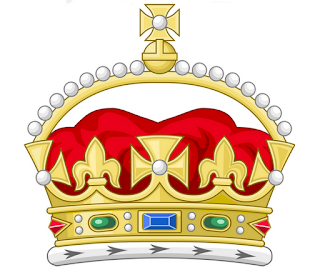 Sean and I have been working our way through Zechariah for a few weeks, and we've been finding a whole lot to ponder on.
Sean and I have been working our way through Zechariah for a few weeks, and we've been finding a whole lot to ponder on.Last time we read chapter six, and the section from verse nine to the end seemed rich with meaning (Zechariah 6:9-15). It's all about Jesus!
Zechariah is called to accept gold and silver from three returning exiles. Their name are Heldai, Tobijah, and Jedaiah. These names are not accidental.
The meanings of the names - Curiously, Heldai can be translated 'mole' or 'worldly' or 'rustiness'. Moles dig underground, and rust reverses the hard work of smelting iron, converting it back to dust. So the name seems to suggest the world and its influence.
Tobijah on the other hand means 'Yahweh is good', and Jedaiah means 'Yahweh's friend'.
The silver and gold is to be made into a crown and set on the head of the high priest whose name is Joshua (ie Jeshua or Yahshua or 'Yahweh saves'). New Testament English translations render this name 'Jesus'. And Jesus of course is, indeed, our Great High Priest.
Let's ponder this a little before we move on. The corruptible world, the goodness of the Most High, and his friend bring silver and gold. And they bring it from the place of captivity, the place of exile.
Heldai represents you and me. We are worldliness. Every believer in Jesus, every one of us, has been rescued from a place of exile. But now we have come out from captivity and from death. We have come to the throne of glory, we are covered by grace, we have come to new life in Christ.
Tobijah represents the Almighty who is pure and good in every way. He is Emmanuel, the Most High with us, he came (as Jesus) into the place of captivity to find us and he travels out from exile with us.
Jedaiah represents the friendship between Heldai and Tobijah. Through Christ we have now become Yahweh's friends, not by our own merit but solely through his. Yahshua said, 'I no longer call you servants, because a servant does not know his master’s business. Instead, I have called you friends, for everything that I learned from my Father I have made known to you.' (John 15;15)
The crown - The gifts of silver and gold are things that will last, things that are worthy of being forged into a crown fit for the King. They're the gold and silver and costly stones that Paul writes about in 1 Corinthians 3:10-15, things that will remain after the fire. The crown is the church, the bride, the thing that complements and completes the King upon his throne. We, his people, are the lasting gifts brought out from captivity and exile and wrought into a holy crown. To us he gave his glory, the glory that the Father has given him. We are his crowning glory, the work of his own hands (I will build my church). This is a mystery revealed to those who have eyes to see. It is an eternal work. It will never fade or fail.
And all of this is laid out by Zechariah, hundreds of years before Jesus of Nazareth called the fishermen from Galilee and brought the vision to ultimate fulfilment in his own life and death and resurrection.
The Father speaks to the Son - In verses 12-15 we read a message from Yahweh Elohim to Joshua the High Priest - or if you like, a message from the Father to the Son. We read about the man whose name is 'The Branch', he is also mentioned in Isaiah and Jeremiah, he is clearly Jesus. He is the one who builds the Temple, he is the one who is clothed in majesty and rules on his throne. He will be a priest on his throne, and there will be harmony between the two. In other words there will be harmony between kingship and priesthood.
This was unheard of in Israel, but in Christ kingship and priesthood are combined. We inherit this harmony through him, hence we are a 'royal priesthood'. (But you are a chosen people, a royal priesthood, a holy nation, God’s special possession, that you may declare the praises of him who called you out of darkness into his wonderful light. - 1 Peter 2:9)
I'd like to leave you with a question. If Jesus is the High Priest and we are priests, what does Jesus being the King make us? Does this affect the way we see ourselves and live our lives?






